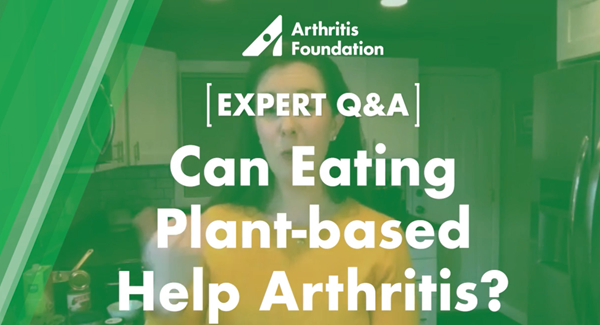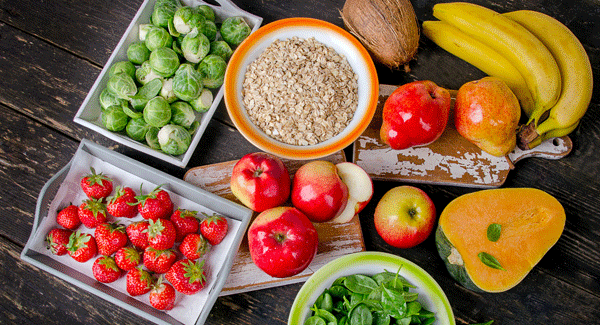Do Vegan or Vegetarian Diets Help Reduce Arthritis Inflammation?
Learn the potential benefits and pitfalls of following the popular diet.
By Amanda Baltazar
Science has long touted the inflammation-fighting benefits of a healthy diet: one low in saturated fats and added sugars and high in fruits, veggies, lean protein (such as omega-3-rich wild salmon) and whole grains. Many people also believe that avoiding animal products makes for an even healthier diet.
As a result, people with inflammatory types of arthritis may be tempted to go vegetarian (no meat) or vegan (no animal products at all, including meat, eggs and dairy) in the hope that doing so will help them better manage their disease. Here’s what you should know about the possible benefits and pitfalls of these diets.
What the Science Says
There are various studies on the impact of these diets on inflammation, but results are mixed. In a 2015 study published in Complementary Therapies in Medicine, 600 participants followed a vegan diet for three weeks which significantly reduced C-reactive protein (CRP), a key marker for acute and chronic inflammation.
Likewise, a 2017 meta analyses of 17 studies published in Public Health Nutrition found that following a vegetarian or vegan diet for two or more years was associated with lower CRP levels. Of the 17 studies evaluated, 12 compared the results of following a lacto-ovo vegetarian diet (one that includes dairy and eggs) versus a diet that includes meat. However, in three of the studies, following a vegetarian diet was also linked to increased levels of another inflammatory biomarker, IL-6. But according to the study’s authors, these findings should be interpreted with caution, and more studies are needed to evaluate the link between vegetarian diets and increased IL-6 levels.
Other Benefits and Potential Pitfalls
Going meat-free has benefits unrelated to inflammation, too. Vegans and vegetarians are less likely than meat eaters to be overweight or obese, and they tend to have lower blood pressure and cholesterol levels, says Duo Li, PhD, professor of nutrition at Zhejiang University in China and author of a small study published in the Journal of Agriculture and Food Chemistry in 2011.
But there are potential pitfalls, too. Vegetarians, and especially vegans, have low blood levels of vitamin B-12 and D, calcium and essential fatty acids, according to Dr. Duo’s study and another study published in the American Journal of Clinical Nutrition in 2014. These vitamins and minerals play important roles in bone health, and low levels of fatty acids are associated with a several cardiovascular risk factors. Vegans may also have higher levels of homocysteine, an amino acid that has been linked to heart disease, and lower levels of HDL, the “good” cholesterol, known to protect the heart.
If you decide to go full or part-time vegetarian or vegan, you may need to take some supplements, says Kim Larson, RDN, CD, CSSD, national spokesperson for the Academy of Nutrition and Dietetics. These include omega-3 fatty acids for your heart and to protect against inflammation, iron to protect against anemia, zinc for the immune system, vitamin D and calcium for strong bones, vitamin B-12 for energy and selenium for a healthy thyroid.
No matter what diet you choose, it’s important to consult with your doctor first and seek guidance from a registered dietician, especially if you want to add supplements.
A Way of Life
With these diets, it’s not just about what you’re avoiding (meat, eggs and dairy), but it’s also about what you’re eating. People who switch to either diet should fill up on more fruits, vegetables, legumes, nuts and seeds and whole grains (i.e., brown rice and barley) instead of empty carbs like white pasta, bread or rice. These healthy alternatives are packed with phytochemicals (plant-based compounds) that include antioxidants, flavonoids and carotenoids, all of which help reduce inflammation and protect the tissues from oxidation, which can damage them.
Any diet, including a vegan or vegetarian one, can reap the anti-inflammatory benefits of adding certain oils, says Larson. Extra virgin olive oil helps reduce inflammation and can have a similar effect of ibuprofen. However, she advises using it at low temperatures because high heat destroys its beneficial compounds, called polyphenols – so use it in salad dressings or for tossing pasta, not just for frying and baking.
If you want to try a vegan or vegetarian diet, start with a “meatless Monday”, and gradually build up to more meat-free meals, advises Rene Ficek, RD, lead nutritionist at Seattle Sutton’s Healthy Eating. You can go vegan overnight, she adds, though doing it gradually often makes it easier both mentally and physically since suddenly cutting out meat can lead to crankiness, headaches and digestive changes.
If you still want to eat meat, consider making it a side dish, rather than the focus of your meal. Try serving it in smaller amounts in a dish that prioritizes vegetables, such as a stir fry or a hearty salad. You can also mix it with a protein-rich soy product such as tofu or tempeh, or with seitan (wheat gluten).
Bottomline: You don’t have to adopt an “all or nothing” attitude to receives the benefits of a mostly plant-based diet “Going vegan or vegetarian doesn’t have to be a full-time commitment; it can be certain days or certain meals,” Ficek says.

Stay in the Know. Live in the Yes.
Get involved with the arthritis community. Tell us a little about yourself and, based on your interests, you’ll receive emails packed with the latest information and resources to live your best life and connect with others.




